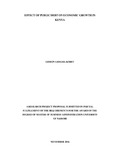| dc.description.abstract | The effect of Public Debt on Economic Growth is a debatable issue between scholars since the onset of the debt crisis in 1980‟s. Public Debt is one of the main macroeconomic indicators, which forms countries‟ image in international markets. It is one of the inward foreign direct investment flow determinants. A prudent Public Debt Management helps economic growth and stability through mobilizing resources with low borrowing cost and limiting financial risk exposure. Kenya being a developing country compliments its revenue through export of primary commodities. In attempt to add to available domestic resources, successive governments have acquired huge sums of Public Debt to finance National Development Plans. A high level of debt in Kenya poses a great challenge for the economy because a large portion of revenues is devoted to servicing the debt instead of being put into domestic investment, thus reducing the prospects of economic growth. The conventional view is that a high level of debt may lead to crowding out and also constrain the scope of counter cyclical fiscal policies, which may result in higher volatility and adversely affect economic performance. This study is therefore an effort to determine the effect of Public Debt on Economic Growth in Kenya. Specifically, the study tries to answer the question whether external debt and debt servicing have any significant effect on Economic Growth. The study uses a linear regression model to analyse Kenyan data from the economic years 1993/1994 to 2014/2015, with GDP growth rate as a function of Public Debt. Unemployment rate and Inflation rate were taken as control variables. The results indicated that Public Debt, Unemployment rate and Inflation rate were negatively related to Economic Growth, but not significant as indicators of Economic Growth. This study recommends to future scholars to research on qualitative variables of Economic Growth such as: corruption, political instability and elections, insecurity and Global economic issues. | en_US |



